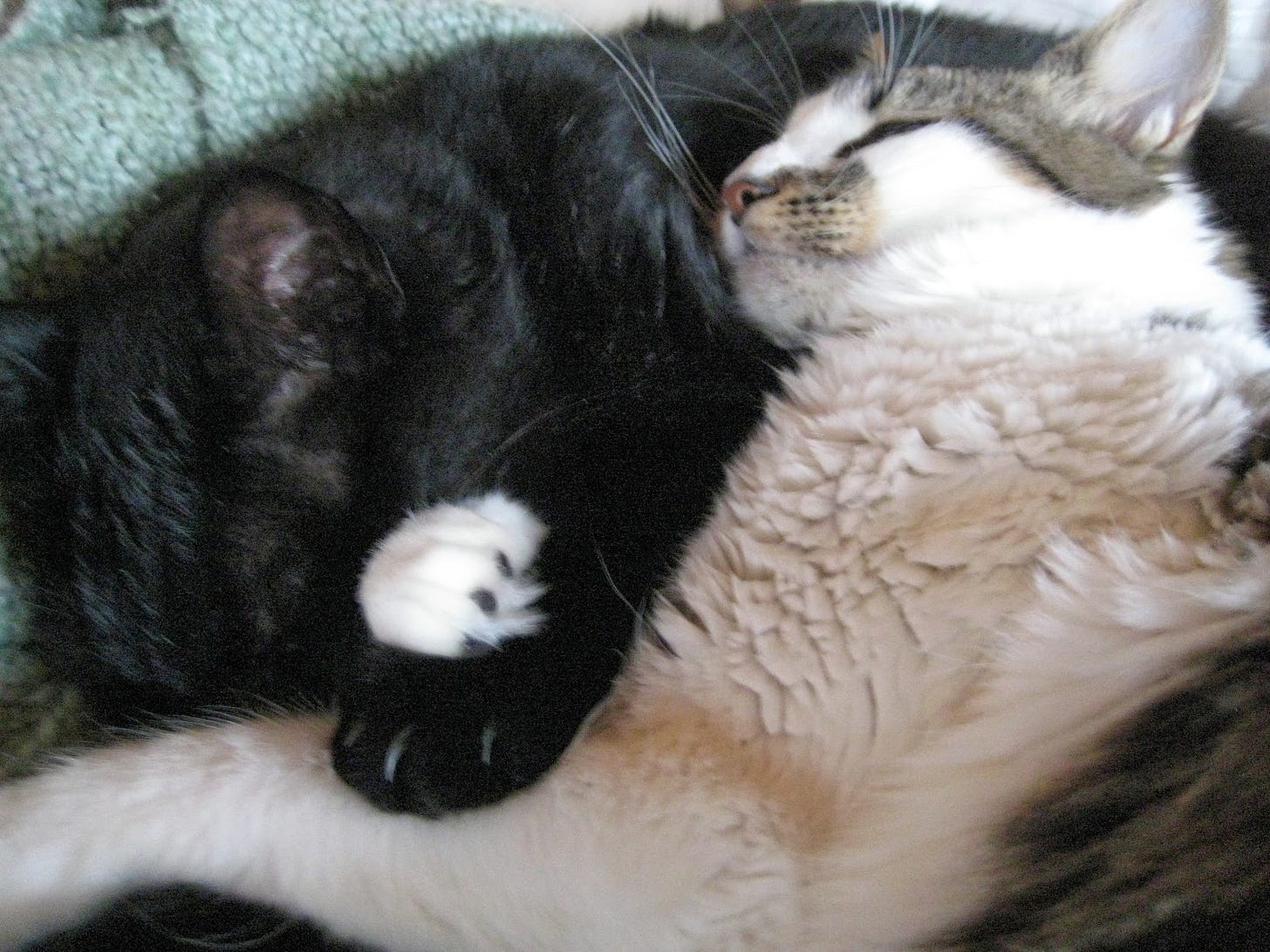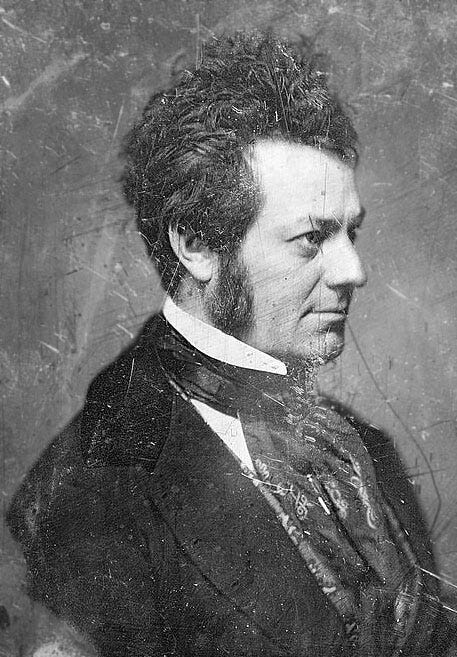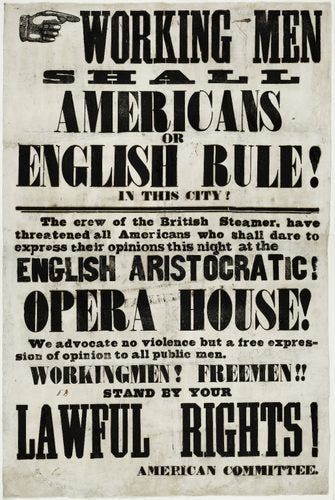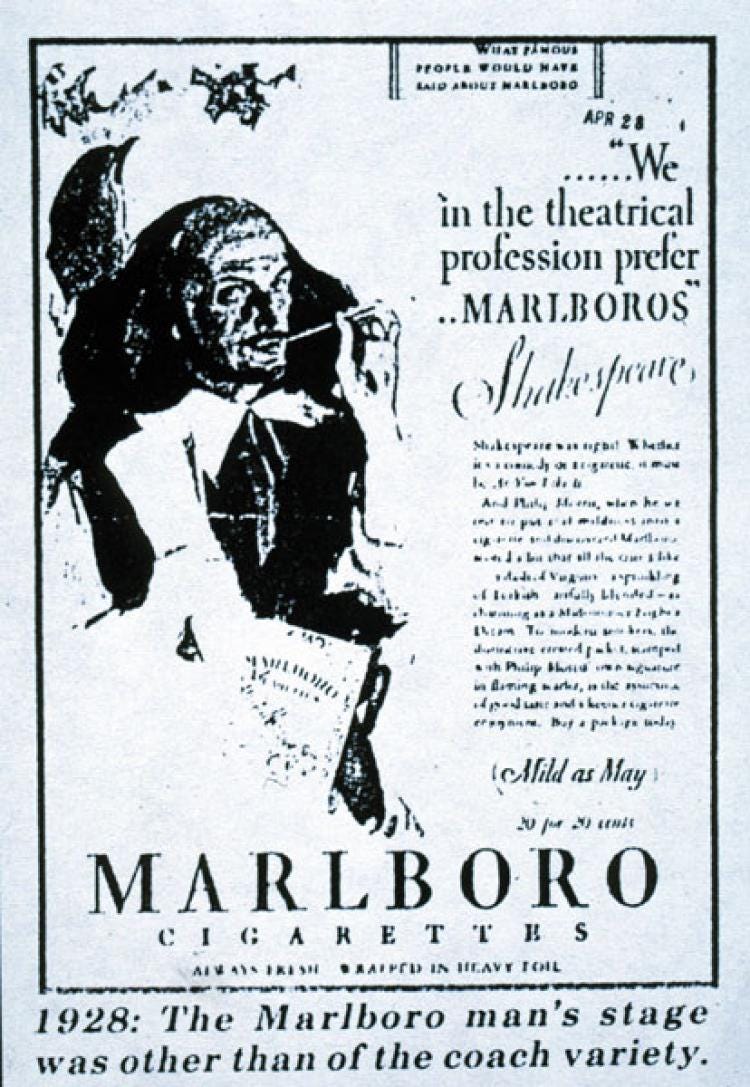
Happy Weekend!
Today is a lot of things! For one, it is Fred Astaire’s birthday. Among other things, Fred Astaire is the original source of my theory that tap dancing is the handsomest of all possible talents. I mean, outside of the tap dancing, he kind of looks like a weird alien, and even when he was young he looked 70 years old. But get that man dancing and you’re like “Oh wow, what a dreamboat!”
And that, friends, is the power of tap.
In addition to Fred Astaire’s birthday, it’s also Bono’s birthday and Sid Vicious’s birthday and Linda Evangelista’s birthday and National Shrimp Day and Micronesia Constitution Day. But most importantly, it is the anniversary of one of my all time favorite historical events — the Astor Place Riot.
This riot had everything. Feuding Shakespearean actors, class warfare, xenophobia, the Irish weirdly teaming up with nativist creeps who hate the Irish because of how much they both hate the English, Herman Melville, and, well, a dead sheep.
Picture it: 1849, New York. Pop culture in the United States is not exactly what it is today. Interestingly enough, though it’s been 200 years since his death, William Shakespeare is super popular among everyone, regardless of class or education level. Theater is also for everyone — because let’s be real, there’s not much else to do.
Oh! And the nation has its very first celebrity. Edwin Forrest, America’s first big time Shakespearean actor.

Now, this was a very big deal, because at that time it was commonly believed that all the great Shakespearean actors — indeed, all of the great actors in general — came from England. Forrest was especially beloved by the working class, who were thrilled to have their own American celebrity actor. Though he often went on tour, he regularly performed in the Bowery Theater, which catered largely to the working class immigrants of the Five Points neighborhood of lower Manhattan. Forrest was especially beloved by that demographic for a variety of reasons — he grew up among them, he was big and brash and loud and bold, and, best of all, he was not from snootypants England.
That’s where William Macready came from. Macready was a real big deal in the West End around Regency times and considered the greatest actor in all of the United Kingdom. He was a very, very big deal.
In fact, he was such a big deal that Charles Dickens wrote him a letter reading, “The multitude of tokens by which I know you for a great man, the swelling within me of my love for you, the pride I have in you, the majestic reflection I see in you of the passions and affections that make up our mystery, throw me into a strange kind of transport that has no expression but in a mute sense of an attachment which in truth and fervency is worthy of its subject.”
So, these guys hated each other. Haaaaaaated each other. Both thought the other’s interpretation of Shakespearean characters was wrong, which only fueled their rivalry. They had both toured the other’s country, getting in widely publicized spats each time. For instance, on one trip to England, Forrest went to go see Macready in a production of Hamlet and loudly hissed at him from the audience.
Then, in 1849, Macready, a critical darling and favorite of the aristocratic classes, came to New York to do a production of Macbeth at the Astor Place Opera House — which had been built specifically for the wealthier people of New York, then called the “uppertens” (short for the upper ten-thousand richest people in New York) so they didn’t have to deal with the riff-raff at the Bowery.
Forrest was not pleased with this, and neither were his supporters — many of whom bought tickets to Macready’s performance just to heckle him and throw things at him. One of those things was a half of a dead sheep, which seems like a difficult thing to take with you to the theater.
Forrest’s supporters were a fairly confusing mix of people, including both “Irish immigrants opposed to all things British and anti-Catholic nativists opposed to the growth of immigrant labor.” Macready had actually been born in Cork, Ireland, but that did not seem to matter much.
Things continued on this way for several nights until Macready was like “Fuck it, I’m out of here” but then he got a letter from a whole bunch of aristocrats and celebs, including Herman Melville and Washington Irving, begging him to stay and promising there wouldn’t be any more nonsense. He agreed.
He stayed for one more show, on May 10, 1849. Now, theater riots — riots of any kind, really — were hardly unheard of at that time, and the city’s newly minted Whig Mayor Caleb Woodhull ( a distant cousin to the husband of Victoria Woodhull, who actually began her campaign for president on May 10, 1872) and brought in a 350-man militia to assist police in case one should occur.
For their part, Forrest supporters went around handing out flyers prior to Macready’s performance, encouraging others to take his side.

Also, that same day, many of Forrest’s supporters started another riot when Frederick Douglass showed up to an anti-slavery meeting with two white women on his arm.
Over 10,000 people showed up, reportedly, to make their feelings known — and when the police and the militia showed up, the whole thing fell into chaos and rioting. Police and the militia got, shall we say, a tad heavy-handed and ended up killing 22-31 people, at least two of whom were actually just bystanders who happened to be walking near the area. Two-hundred-eleven police and militia were also injured.
There’s a whole side-plot here involving the Whigs and the Tammany Hall Democratic machine, but I’m not gonna get into that right now. There are also, you’ve probably gathered, more than a few parallels to our current political situation.
Some have said this was the beginning of the end of Shakespeare being a thing appreciated by people of all education levels and classes, as the working class soon gravitated towards vaudeville. I’m not totally sure of that, given that Shakespearean quotes and characters were regularly used in advertisements right through the late 1800s, the assumption being that everyone would have been familiar, but who can say!

Have you been struck with a sudden urge to shower us with money and jewels? If so, we are on Substack now so you can just go ahead and click subscribe! Click click click!!
Or if you’d just like to donate just once …
You can also join our Patreon, or buy our merch. Or we’re now partnered with Martie, where you can buy snacks!
You can even send us paper checks to:
Wonkette
PO Box 38273
Detroit MI 48238
Talk amongst yourselves!
www.wonkette.com (Article Sourced Website)
#Lets #Talk #Time #Feud #Shakespearean #Actors #Turned #Deadly #Riot
